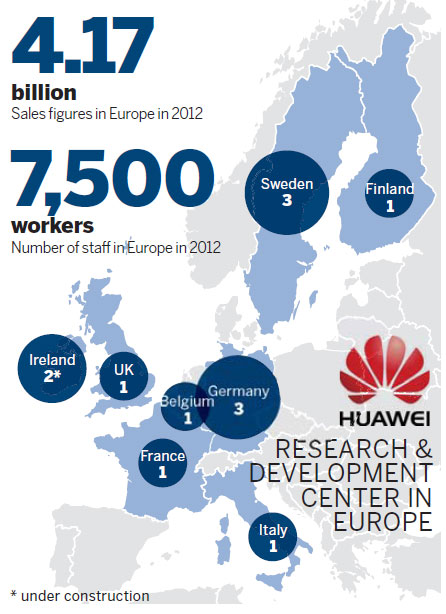
Their most important customer is only five minutes away, and for Huawei in Germany, that's a definite advantage, according to Tao Jingwen, president of Huawei West Europe Region.
China's largest telecom equipment maker has set up operations about 20 minutes' drive from the Dusseldorf city center, and is almost next door to its most important business partner here, Vodafone.
In 2007, the Chinese company decided to close the distance with its client by moving its headquarters from the United Kingdom to Dusseldorf, the business heart of Germany.
It has been a strategic move that paid off. Huawei is often quoted by local officials as the success story of Chinese investment here. It entered Europe a decade ago, and since 2011, this has been its largest market outside of China.
In 2012, it recorded $400 million from the European market, or about 13 percent of Huawei's total global revenue.
Its European operations had started in 2002 at a time when companies in the region were very keen to attract international partners.
Huawei now has about 7,000 employees in Europe, 70 percent of whom are local workers.
"In the next three years, we plan to recruit another 4,000 employees here, and reduce the number of Chinese expatriates," Tao said.
He said Europe is a leading market for telecommunication technology, and there are still opportunities for Huawei to build up its business.
"In Germany, there are still 2 million households without broadband access," Tao explained.
At a time when companies in Europe were still looking for international partners, Huawei attracted the attention of both Vodafone and British Telecommunications. Four years of hard negotiations later, BT used European yardsticks to measure Huawei's corporate standards, including worker welfare and product security.
"We signed the contract in 2006, as one of the back-up solutions for BT. The British company reached 10 million users last year, nine years ahead of schedule, and it was Huawei that ended up building most of the projects."
It was a steep learning curve for Huawei as it adapted to European standards of production, and Tao said keeping prices low had nothing to do with the persuasion process.
Now the company has about 800 employees working on research and development in Europe, at more than 10 R&D sites, exploring new technology such as wireless, future network and chipset design.
"We now have about 6,000 stations in Germany using this new technology, which results in energy savings of about 60 percent."
According to Huawei, this can save up to 750,000 tons of carbon emission annually compared to traditional technology in Europe.
Tao said the company will place greater emphasis on cooperation with local partners this year and next year.

Copyright ©1999-2011 Chinanews.com. All rights reserved.
Reproduction in whole or in part without permission is prohibited.